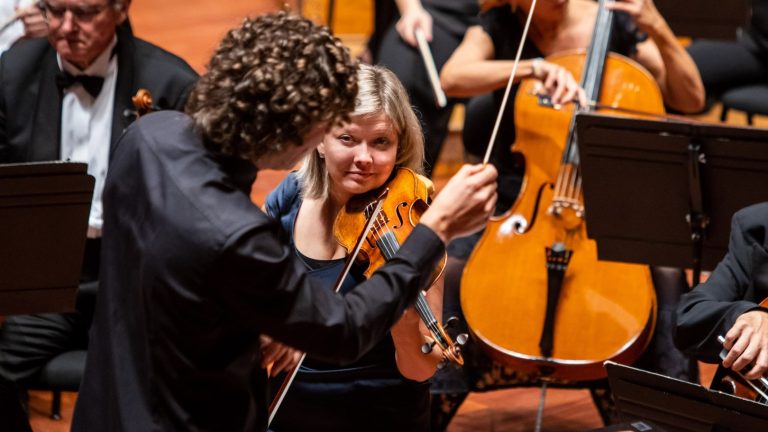In the music world, war has a hard time existing. In the last week, four concerts, three at Müpa Budapest and another at the Liszt Academy, were all-Russian music programs. All four concerts were full houses. The reasons for this have nothing to do with present-day global politics, and everything to do with the love of great music.
Müpa’s three concerts, on 6, 7, and 8 October, offered the Budapest Festival Orchestra’s program of Liadov, Prokofiev, and Rachmaninoff, conducted by Robin Ticciati, and featured the brilliant violinist, Alina Ibragimova. Aside from the joyful announcement of their receiving the Orchestra of the Year Award from London’s Gramophone magazine, the musical experience for me was an especially deep and emotional dive into my own Slavic soul.
I mused, as I surveyed the large audiences, that one would never guess that there’s a war going on just across the border. I further mused that this kind of program would probably never be heard in the U.S., especially now.
Pianist Marcell Szabó, who is also the founder of the Russian Music Festival (Orosz Zenei Fesztivál) in Hungary, explains it like this: “I believe Hungarians do like Russian music. I always say that I think we share some similiarities in our souls; we usually are not the happiest people, but we can have a good time even in the worst circumstances. This melancholic state of mind I think is shared between the two nations and I believe we can sense this through music and we can resonate [with] it.”
The festival opened its 5th season on 10 October at the Liszt Academy with an all-Scriabin program featuring two Hungarian pianists, János Palojtay and Gábor Csalog. They split the concert into two parts: the first for the composer’s early romantic style works, and the second for his later “mystical” pieces.
Alexander Scriabin’s (1871-1915) music follows the similar trajectory to the careers of Liszt, Bartók, Schoenberg, and Berg – composers who, as they crossed over into the 20th century, developed new compositional styles. Scriabin’s famous six-note “mystic chord,” which reflected his personal brand of metaphysics and preoccupation with synesthesia (appropriating colors to musical tones), haunts many of his piano works.
On this program’s second half, his dizzyingly dissonant ‘Black Mass’ Sonata plunged us into his own theosophical chaos. After many short Etudes and Preludes, the program ended with two rapturous “Poemas” and the flamboyant 5th Sonata.

Palojtay was especially poetic in his dynamic interpretations of a long list of late romantic and fanciful works, which he played from memory. Csalog took a more scholarly approach, using the scores for most of the mystical pieces which expressed the composer’s wild visions, existential crises, and magical illuminations.
The value of Scriabin’s music has always been hotly contested by musical experts and non-experts alike. He’s controversial, quirky, and a visionary voice in the early 20th century. The audience that night blissfully forgot about the current tribulations with Russia, and soaked up the mystical sonorities like a thirsty sponge, and wanted to hear more, much more.











